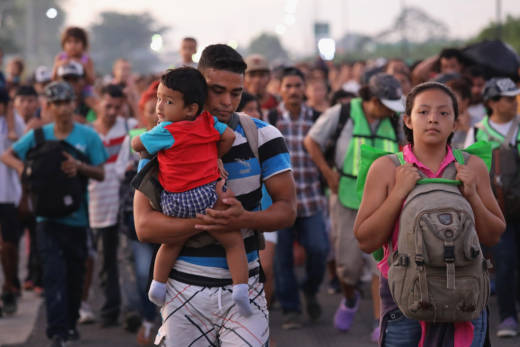A Catholic church group in El Paso, Texas, that provides temporary housing for hundreds of migrant families released from local detention facilities each week, expressed concern. In an email to supporters, Annunciation House warned that the group’s shelters could be overwhelmed.
“Annunciation House is committed to increasing its network of hospitality centers so as to prevent releases to the street," the email says. "Right now we are not there yet and so I expect that we will start seeing families with their children on the street in the coming days.”
But Vicki Gaubeca with the Southern Border Communities Coalition in Tucson, Arizona, said that in recent years ICE has already been making large-scale releases of families without ensuring they have transportation arrangements from border detention facilities.
“It's not an unusual event,” Gaubeca said. “But it is part of the enhanced political theater … that's in essence trying to rally the Republican base to come out and vote through a narrative of fear.”
Gaubeca said the ICE policy change seems calculated to give an impression that migrants seeking refuge in the U.S. will overwhelm border communities. But, she said, that has never been the case.
Gaubeca speculated that the ICE announcement was related to an executive order the president is expected to announce next week, aimed at blocking a caravan of thousands of Central Americans seeking asylum in the U.S.
In San Diego, advocates also said they had seen no changes to the number and manner of family releases since the government’s announcement.
Lauren Cusitello with Crossroads Justice Center, a nonprofit group that provides legal services to migrants, said community organizations in the San Diego can provide a lot of support to migrant families.
“There are resources available to make sure that that they are safe and healthy,” Cusitello said.
But she worried that if ICE stops reviewing families’ post-release plans, the burden will shift to nonprofit and church groups to locate families and ensure their safety. And that could mean some people don’t get help.
“There may be people whose needs go unmet even though there are providers in the community,” Cusitello said.
In her statement, ICE’s Rodriguez said: “The government remains severely constrained in its ability to detain and promptly remove families with no legal basis to remain in the U.S.”
She went on: “[D]ue to the recent uptick in family units presenting themselves along the Southwest border, ICE no longer has the capacity to conduct … reviews without risking violation of the Flores limitations on lengths of stay for families in both [U.S. Customs and Border Patrol] and ICE custody.”
The 1997 Flores Settlement Agreement requires migrant children to be kept in the least restrictive environment possible and released from custody as soon as possible. Children who cannot be released, must be transferred to a state-licensed child care facility, usually within 72 hours. A federal judge has ruled that the agreement applies to children with a known parent as well as those who arrive at the border without their parents.
Carlos Holguín, one of the plaintiffs’ attorneys in the Flores case, said the change in ICE policy is “not necessary” to comply with the settlement agreement. That’s because the number of migrant kids has been high in recent years, triggering an exemption to the 72-hour rule.
According to Holguín, the government must simply release children from unlicensed immigration facilities along the border “as expeditiously as possible.”
“The only hard limit on family detention right now is the capacity of the three family detention centers,” Holguín said. “Inasmuch as those are not full, ICE’s statements appear aimed at spreading disinformation.”

